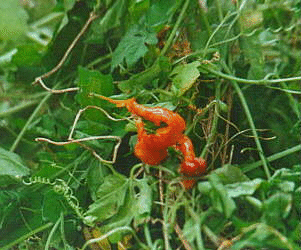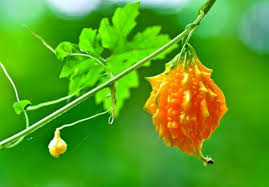


IMPORTANT: The information provided is for information only. The medical claims or advice are not endorsed. Never take any medicines without first consulting a qualified practitioner.

Cerassee (momordica charantia), also known as bitter melon is a very popular herb in Jamaica, feared by many because of its bitterness. It is believed to be a blood cleanser and sugar control agent for diabetes. It is widely accepted that a fair amount of consumption of this tea on a weekly basis will prevent colds, flu, headaches, jaundice, and stomach ache. Cerassee is extremely bitter, and a ghastly tasting but beneficial Jamaican herb.
Cerassee tea may be sweetened with honey or maple syrup. This medicinal herb which is used in Jamaica and many other tropical and sub-tropical countries around the world is still revered by many.
The bush grows wild, unaided by human device. Though it produces pretty bright, yellow flowers and an orange-coloured fruit, it is often viewed as no more than a nuisance, creeping through the garden. Tea brewed from the leaves is popular among rural folk but considered too bitter by most Jamaicans.

Traditional Indian, Chinese and African pharmacopeia, however, for centuries have appreciated the value of this vine-type plant Cerassee (also called Bitter melon, Karela, Balsam pear) has pride of place as a laxative, anthelminthic and an abortifacient. Reports are that even in some of the most modern hospitals in India, Cerassee is dispensed so confident are their doctors about the herb's positive effects on diabetics.
In more recent times, scientists have identified and extracted several active proteins from Cerassee including MAP-30, alpha-momorcharin and beta-momorcharin which have indicated putative value as anti-HIV agents.
The Memorial Sloan Kettering Cancer Center cites that several active substances in bitter melon have been studied in both animals and humans. These experiments show that these substances act in the same way as insulin, by increasing the entry of glucose into cells and promoting its processing and storage in the liver, muscle, and fat. Bitter melon also prevents the conversion of stored nutrients to glucose and the release of this glucose into the blood. However, researchers have not established the correct dosage of bitter melon for effectively treating the high blood glucose levels in diabetes, and therefore it cannot be recommended as a replacement therapy for insulin or hypoglycemic drugs.
Bitter melon extracts were shown to kill leukemia cells in the laboratory and slow the growth of breast cancer in mice, but it is unknown whether these effects occur in humans. A study in humans showed bitter melon had little effect on the immune system of cervical cancer patients.
Of it's purported benefits, Sloan Kettering also summarizes the following:
In Jamaica, the leaves and stem are usually boiled or drawn into a tea and taken for a number of ailments including hypertension, diabetes, parasitic worms, abdominal pains and detoxing the body and blood. Cerasee is also used as a tea to reduce menstrual pains and for urinary tract infections. It is also used for constipation and sometimes given to children for fevers and colds.
Cerasee is also combined with other herbs to make a bush bath, or to treat skin problems like rashes and eczema. Also, in some cases, the fresh leaves and stem are crushed and rubbed on the skin to deal with skin problems such as insect bites, rashes and eczema.
The plant, which is rich in vitamins A and C, phosphorus and iron, is commercially packaged as tea bags by for commercial sale by several companies in Jamaica. Cerasee and ginger tea bags are two products that have seen a significant increase in demand, particularly from the United States.